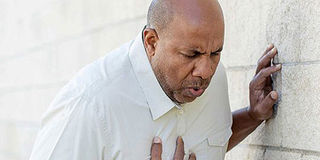Effective natural remedies for hiccups

What you need to know:
- Being stressed, gobbling down a meal, stuffing your stomach with too much food and certain lung disorders such as pneumonia which irritate the diaphragm can give rise to hiccups.
A hiccup is basically an involuntary action of muscles present in the throat canal. It occurs when the diaphragm muscles contract suddenly, leading to the closing of the vocal cords, emitting a prominent intermittent sound.
Being stressed, gobbling down a meal, stuffing your stomach with too much food and certain lung disorders such as pneumonia which irritate the diaphragm can give rise to hiccups. Less often, severe triggers such as a stroke, brain tumour or hypersensitivity to other medications can also contribute to persistent hiccups.
Although hiccup is the common term, the condition is medically referred to as singultus. Usually, they only last for a few minutes and gradually stop on their own. And in case you are looking for some quick-fix solutions to pacify those sudden bouts of hiccups, read on.
Pat on the back
When hiccupping uncontrollably, gently pat your back, from behind your neck along your spine. This helps release the tension in the diaphragm muscles and stops hiccups.
Drink warm water
Slowly sip on a glass of warm water. This helps stimulate the activity of the vagus nerve that travels from the brain down to the stomach and thus reduces hiccups.
Sugar on the tongue
Take about half a teaspoon of sugar and keep it at the far end of the back of the tongue. Hold this for two minutes and then swallow the sugar. Applying pressure along with the tongue aids in eliminating the tightness in diaphragm muscles.
Bite a slice of lemon
The pleasant aroma combined with the tangy flavour of lemons naturally invigorates the nasopharynx muscles. This, in turn, relaxes the knots in the diaphragm muscles and decreases hiccups.
Hold your breath
Holding your breath for a few seconds effectively retains some carbon dioxide in the body. This functions to eliminate the spasms in the diaphragm, thereby preventing hiccups.
Source: netmeds.com




